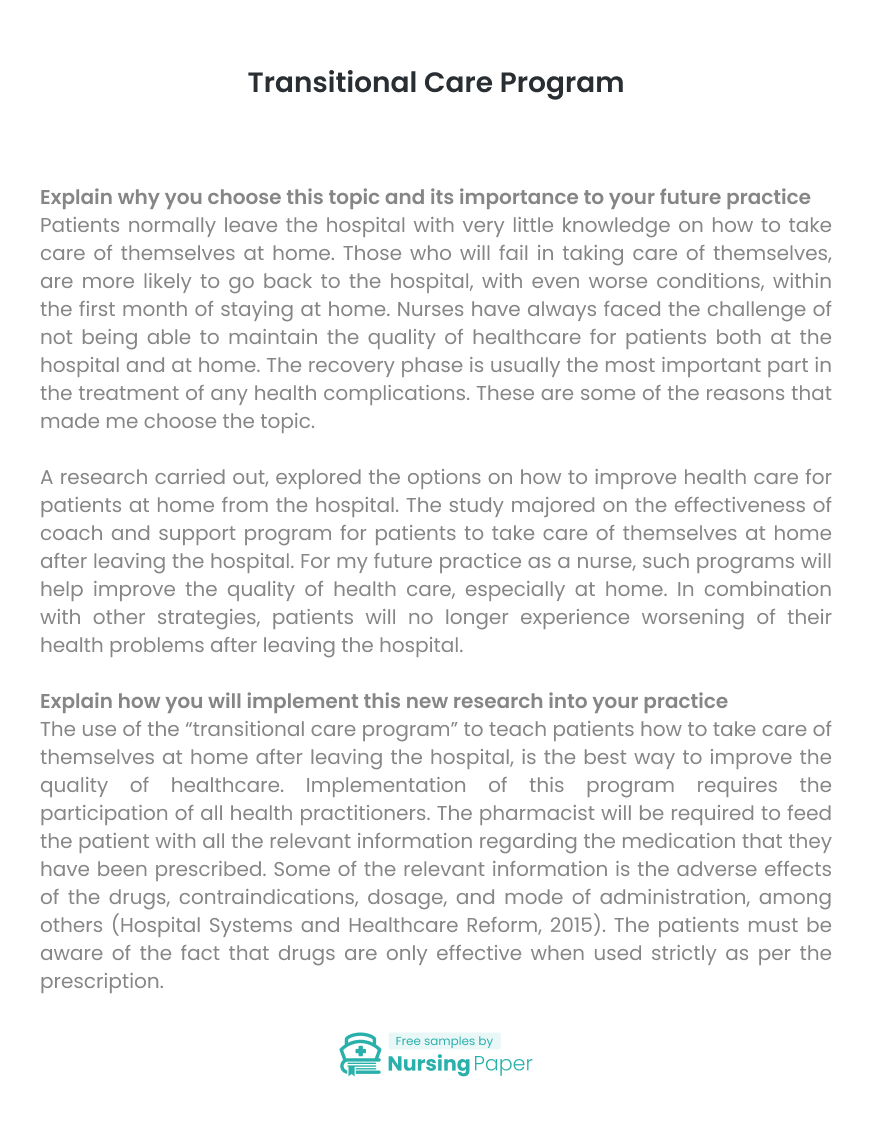
Transitional Care Program
Explain Why You Choose This Topic and Its Importance to Your Future Practice
Patients normally leave the hospital with very little knowledge on how to take care of themselves at home. Those who will fail in taking care of themselves, are more likely to go back to the hospital, with even worse conditions, within the first month of staying at home. Nurses have always faced the challenge of not being able to maintain the quality of healthcare for patients both at the hospital and at home. The recovery phase is usually the most important part in the treatment of any health complications. These are some of the reasons that made me choose the topic.
A research carried out, explored the options on how to improve health care for patients at home from the hospital. The study majored on the effectiveness of coach and support program for patients to take care of themselves at home after leaving the hospital. For my future practice as a nurse, such programs will help improve the quality of health care, especially at home. In combination with other strategies, patients will no longer experience worsening of their health problems after leaving the hospital.


Explain How You Will Implement This New Research Into Your Practice
The use of the “transitional care program” to teach patients how to take care of themselves at home after leaving the hospital, is the best way to improve the quality of healthcare. Implementation of this program requires the participation of all health practitioners. The pharmacist will be required to feed the patient with all the relevant information regarding the medication that they have been prescribed. Some of the relevant information is the adverse effects of the drugs, contraindications, dosage, and mode of administration, among others (Hospital Systems and Healthcare Reform, 2015). The patients must be aware of the fact that drugs are only effective when used strictly as per the prescription. A nurse will also be required, especially in helping the patient prepare to go home. The nurse will make sure that the patient has taken all the medication and instructions required for the recovery process before leaving the hospital.
While at home, a visiting nurse or a pharmacist will be required to check on the patient regularly. It is important to examine the drug compliance and rate of recovery of the patient even at home. In case of any unusual developing infections, action will be taken immediately to prevent worsening of the conditions. Patients and their family members will also be provided with communication links to the hospital in case of any unusual occurrences (In Aronson, & American Academy of Pediatrics, 2014). For patients who will require to administer their medication intravenously, the nurse will provide them with clear instructions on how to do so (Spinelli, & Benevolo, 2018). Lastly, a nutritionist can advise the patients on what foods to take and those to avoid during the recovery phase. Patients with lifestyle diseases such as heart failure will also be advised on their eating habits and type of exercise to adopt.
Once the whole program has been implemented, the quality of healthcare will have improved greatly with very minimal health complications, and reduced hospitalization time.

1. Spinelli, R., & Benevolo, C. (January 01, 2018). From Healthcare Services to E-Health Applications. Hospital Systems and Healthcare Reform. (January 01, 2015).
2. In Aronson, S. S., & American Academy of Pediatrics. (2014). Model child care health policies.



The download will start shortly.

The download will start shortly.
 Subject:
Medicine
Subject:
Medicine  Number of pages: 7
Number of pages: 7  Subject:
Health and Social Care
Subject:
Health and Social Care  Number of pages: 4
Number of pages: 4  Subject:
Health and Social Care
Subject:
Health and Social Care  Number of pages: 3
Number of pages: 3  Subject:
Nursing
Subject:
Nursing  Number of pages: 3
Number of pages: 3  Subject:
Nursing
Subject:
Nursing  Number of pages: 6
Number of pages: 6  Subject:
Medicine
Subject:
Medicine  Number of pages: 2
Number of pages: 2  Subject:
Health and Social Care
Subject:
Health and Social Care  Number of pages: 2
Number of pages: 2  Subject:
Health and Social Care
Subject:
Health and Social Care  Number of pages: 5
Number of pages: 5  Subject:
Medicine
Subject:
Medicine  Number of pages: 4
Number of pages: 4  Subject:
Nursing
Subject:
Nursing  Number of pages: 2
Number of pages: 2  Subject:
Medicine
Subject:
Medicine  Number of pages: 2
Number of pages: 2  Subject:
Health and Social Care
Subject:
Health and Social Care  Number of pages: 2
Number of pages: 2  Subject:
Medicine
Subject:
Medicine  Number of pages: 3
Number of pages: 3  Subject:
Nursing
Subject:
Nursing  Number of pages: 6
Number of pages: 6  Subject:
Medicine
Subject:
Medicine  Number of pages: 6
Number of pages: 6 
